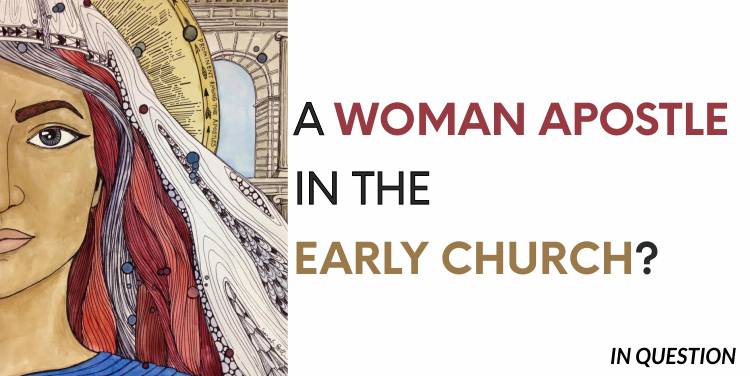Were there any women in leadership in the first-century church? And does the New Testament provide a clear answer to this question?
Some Christians are convinced that Scripture does not allow women to have key leadership roles in the church. For these sincere Christians, women may be allowed to teach other women and children, but women cannot “have authority over other men” in the church. Such people may assume that Paul would have supported their view.
If that was true, we would never find trace of a woman apostle in the New Testament. Right? Wrong!
Let’s begin with Priscilla, Phoebe and Junia. Who were they?
First of all, they are Christian women in the first century. Second, all three are mentioned in the same chapter, at the end of Paul’s important letter to the Romans. Third, they were significant leaders in the early church. One of them is even called an apostle!
In his letters, Paul mentions several respected colleagues in the spread of the gospel, including women such as Euodia and Syntyche. Read Philippians 4:2-3. These women—though unfortunately in conflict when Paul wrote the letter—had served alongside him and other co-workers.
Romans chapter 16 is like an iceberg that points to the reality that “under the surface” there were many more (unnamed) women leaders in early Christian churches. It is notable that eight women are among the dozens of friends Paul mentions specifically.
Priscilla is mentioned first (before Aquila) in four out of six instances. This is significant. It probably means that she was the more prominent one with respect to leadership.
He describes four women, Mary, Tryphena, Tryphosa, and Persis as those who have “worked hard in the Lord” for the Roman Christians. This clearly suggests influence and leadership (verses 6, 12), since such a description elsewhere refers to leaders (1 Thess 5:12 & 1 Cor 16:16-18).
Many readers of the New Testament will recognise the names of Aquila and his wife Prisca/Priscilla. They both were ministry partners with Paul (Acts 18:1-3, 18, 26; Rom 16:3; 1 Cor 16:19; 2 Tim 4:19). If you look at these references, you will notice that Priscilla is mentioned first (before Aquila) in four out of six instances. This is significant. It probably means that she was the more prominent one with respect to leadership. She may have been the main teacher in the episode where Apollos was taught “more adequately” the way of God (Acts 18:26).
Coming to Phoebe: Paul sends his letter to the church at Rome through this lady (Rom 16:1-2). He calls her a “deacon” (diakonos) of the church, which suggests a leadership position in Cenchreae (compare with 1 Tim 3:8). The word diakonos is also used of other leaders, including Paul, and even Christ (1 Cor 3:5 & Rom 15:8). She is also a wealthy benefactor (prostatis) to the church and to Paul. Paul asks the Roman church to receive her in a worthy manner. So, Phoebe is not just a “post-woman”—she is Paul’s specially chosen representative to the Roman church, someone who would have been familiar with the message of the letter, and, who knows, may even have collaborated in the writing of it.
Who is Junia? She is mentioned along with her husband Andronicus in verse 7. They are a missionary couple, like Priscilla and Aquila. Significantly, Paul refers to them as apostles, probably from among a group (apart from the Twelve) who had seen the risen Christ. Again, please note: Paul calls Junia, a woman, an apostle! Recent scholarship has shown beyond doubt that earlier English translations of the name as “Junias” (a male name) are clearly wrong. The masculine name Junias is unknown in Greco-Roman sources; whereas some 250 instances of the female name Junia have been found. This was always understood so in the early church. For example, John Chrysostom, the fourth-century archbishop of Constantinople, said how remarkable it was that Paul speaks of Junia, the first woman apostle. Interestingly, even some vernacular translations of her name are usually correct—like in the Tamil Bible, Yu-nia.
Recently, the Assemblies of God of North India, in January 2017, officially ordained over a dozen women—many of whom have been serving for decades.
What does this mean to us today?
However, we interpret the so-called problematic texts of 1 Corinthians 14:34-35 and 1 Timothy 2:11-12—which to some appear to forbid women in public ministry—we can never say that Paul was against women in leadership in the church.
Undoubtedly, this matter is a hot potato in some circles. My denomination, the Assemblies of God (at least in the US) has a clear position regarding “The Role of Women in Ministry”. (See www.ag.org and the position paper under Beliefs.) Presently, a quarter of the ministers are women in the Assemblies of God of USA. But, truth be told, not all in my denomination are convinced of this view. Some speak of “cultural factors” which prevent us in India from giving leadership to (or ordaining) women in our churches. Yet, in the Assemblies of God of Sri Lanka, our geographical and cultural neighbour, there are two dozen ordained women, some serving as lead pastors, presbyters, and Bible college teachers. Recently, the Assemblies of God of North India, in January 2017, officially ordained over a dozen women—many of whom have been serving for decades.
In our churches, where most often women outnumber men, should we not have more women in leadership? And, if different leadership functions are gifts of the Holy Spirit to the church, what are we to conclude about the Spirit’s choices? Can we make a case that the Spirit does not confer leadership gifts on the womenfolk in our churches? Since the day of Pentecost, the Spirit is being poured out on all people, both women and men (Acts 2:17-18).
Is the Indian church losing out, hugely, by not officially and enthusiastically recognising and encouraging women who are being gifted by the Holy Spirit for leadership?






